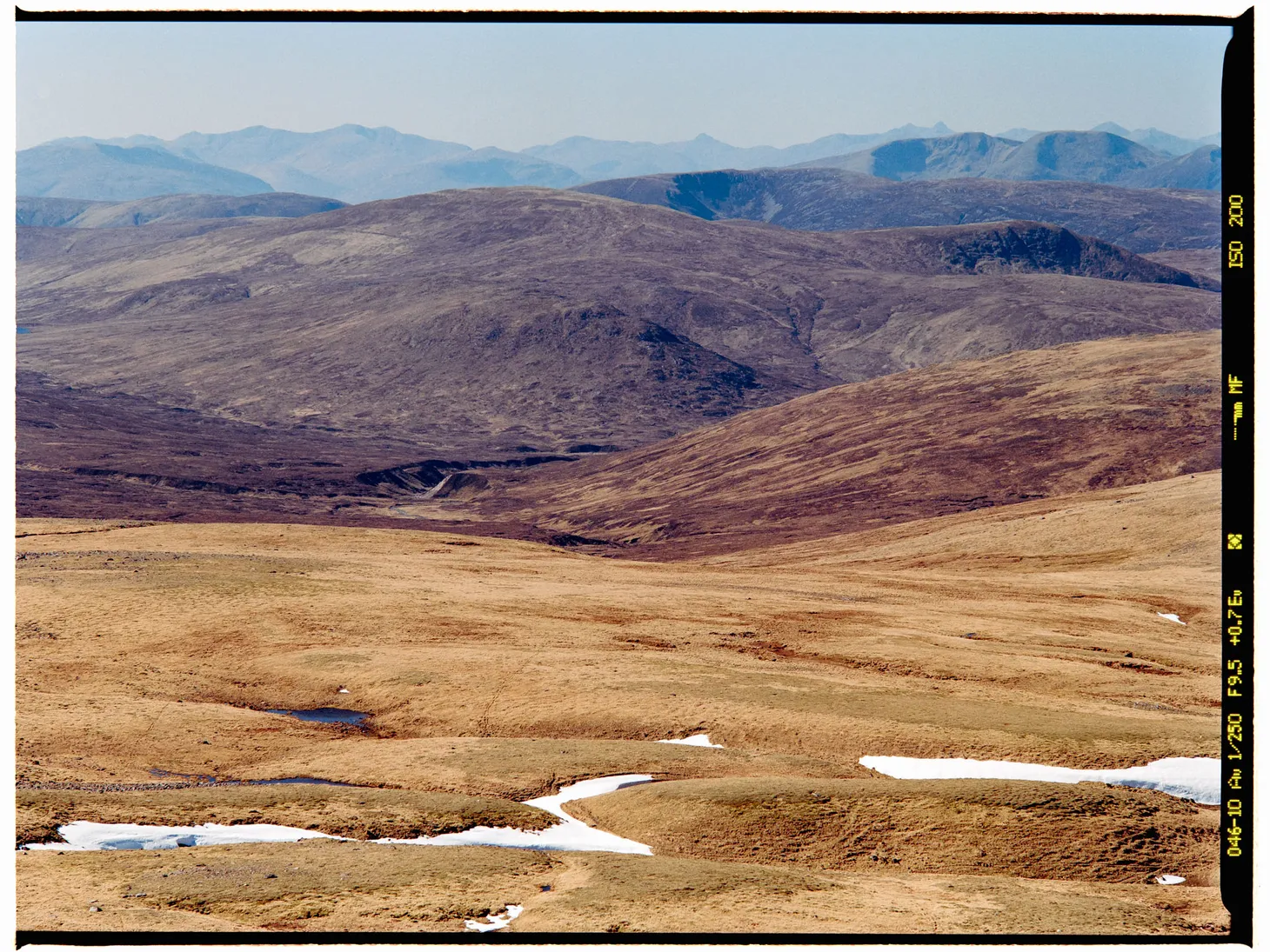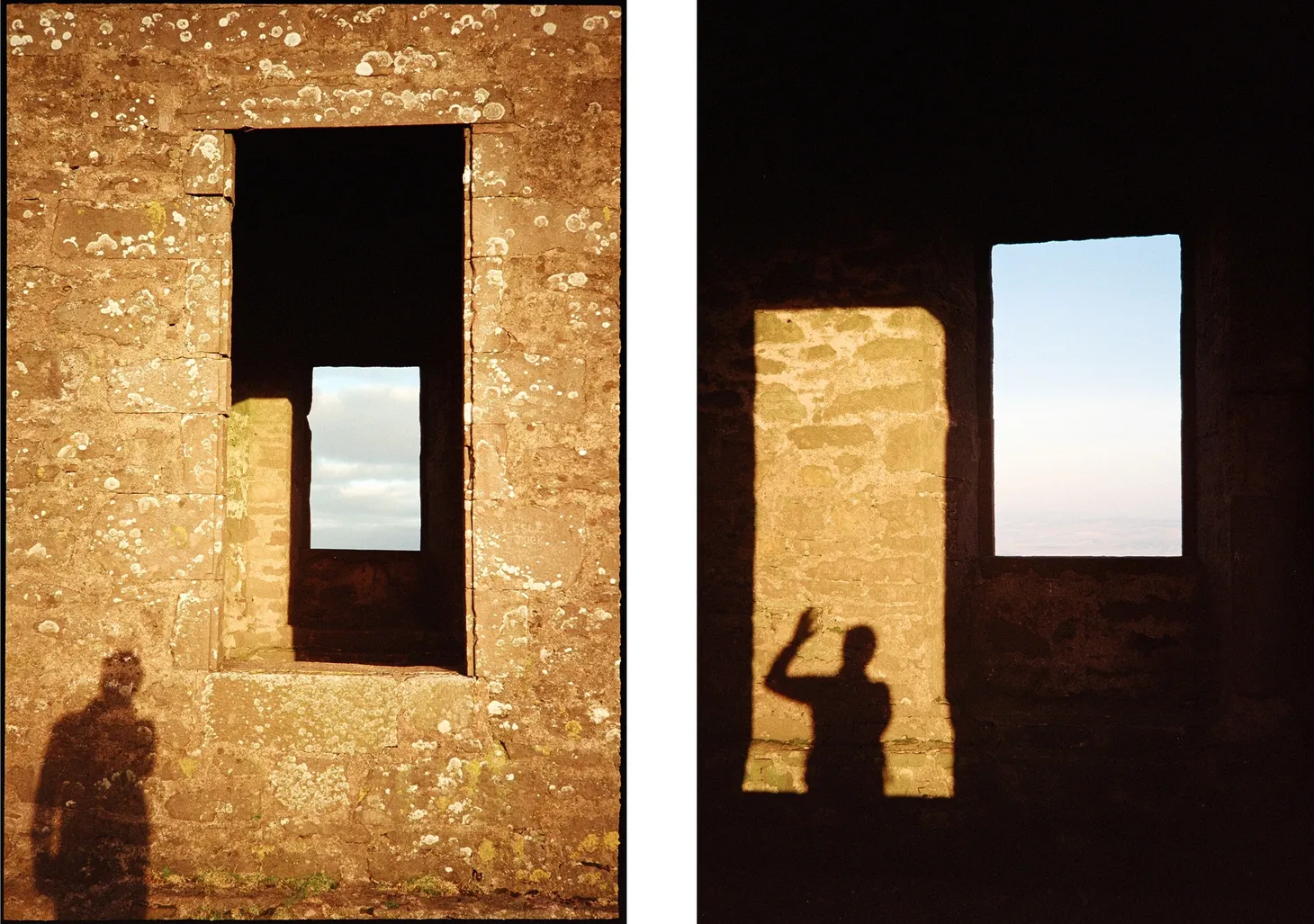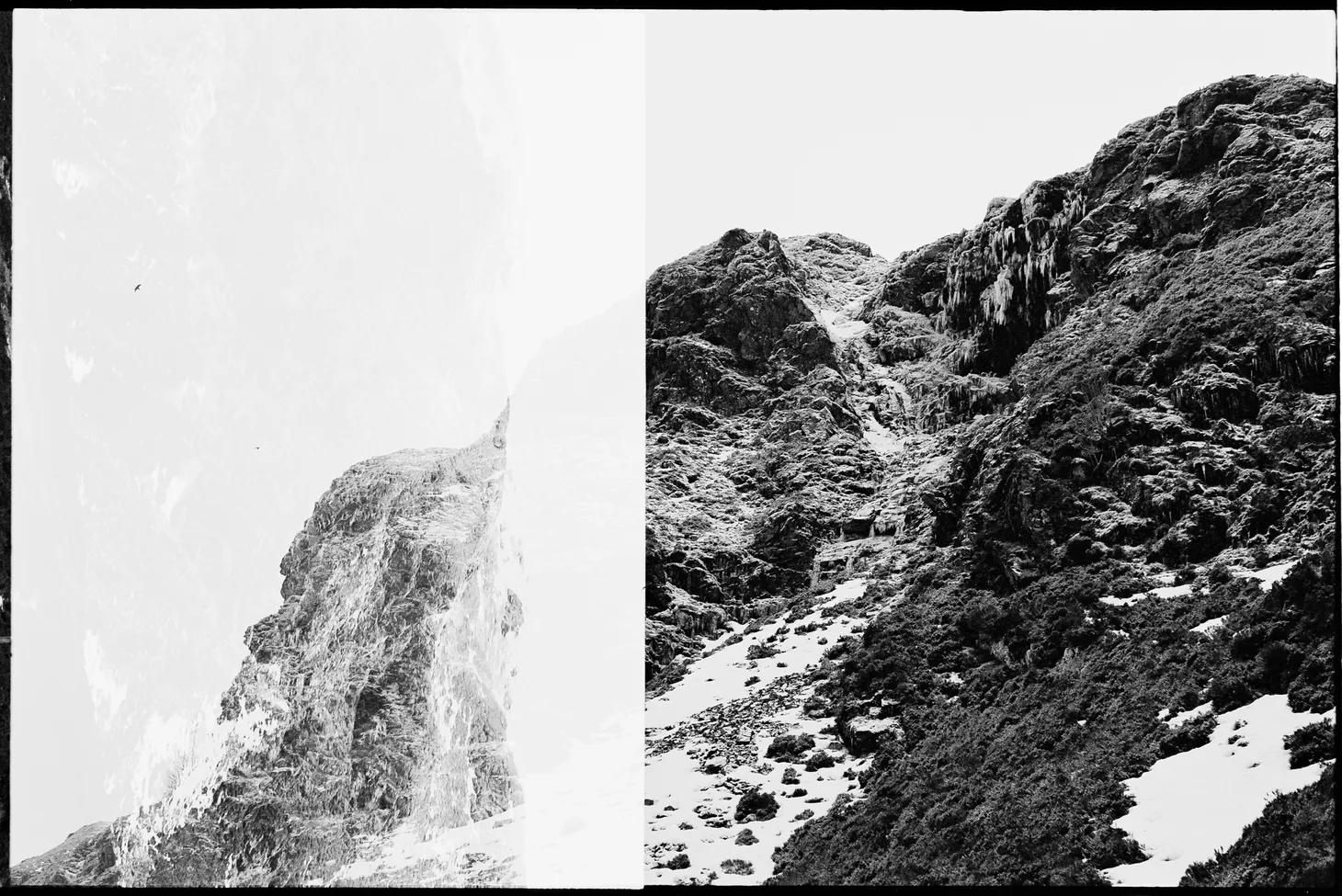Unplugged #11: Uncertainty and adventure, a wildfire outside, the enshittification of komoot, and the rise of New Romanticism
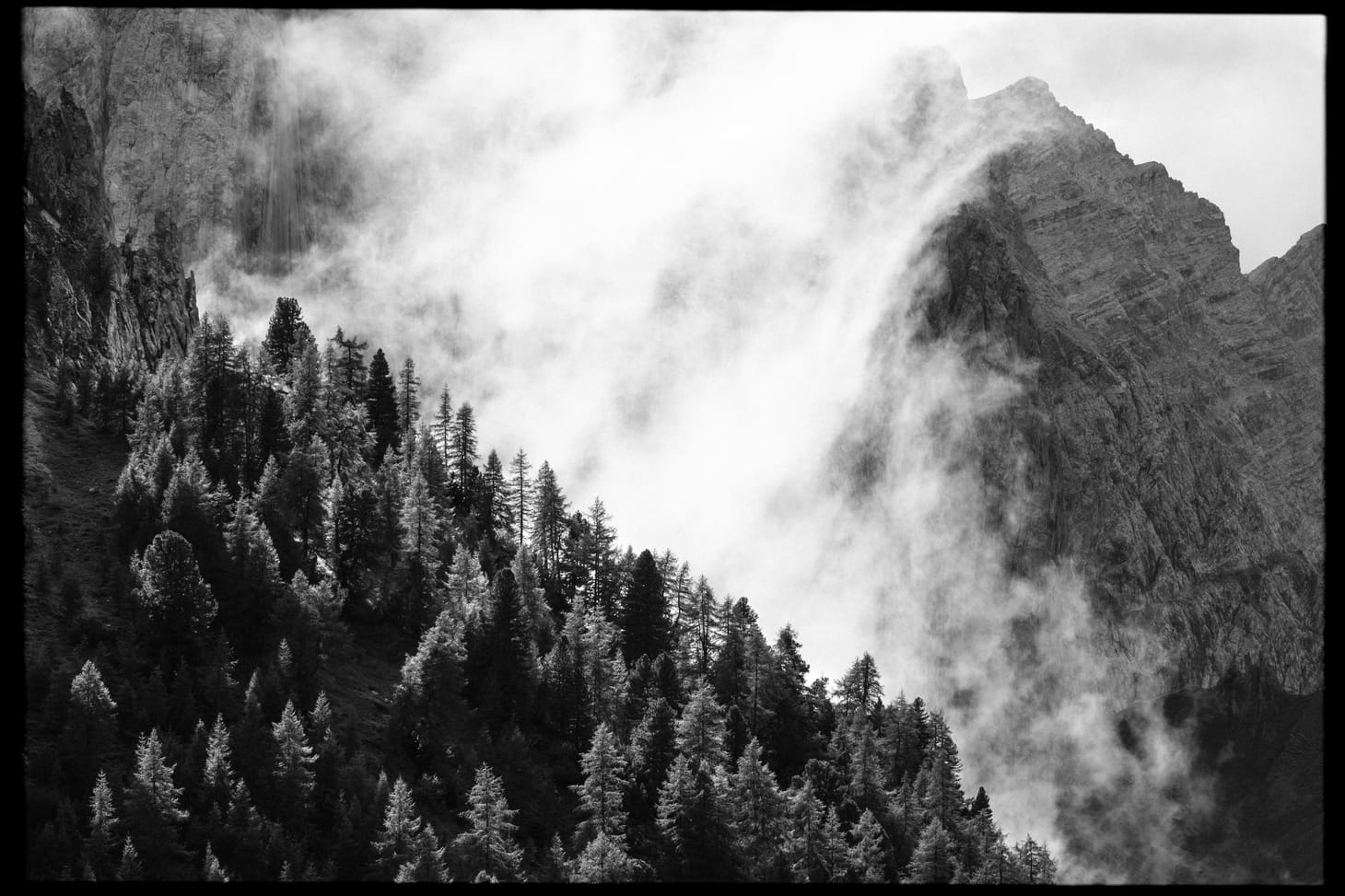
What do Cicerone guidebooks, an adventure app acquisition, the Luddite uprising of 1811, the Outside crisis, and the music of Ludwig van Beethoven have in common? Dear reader, I am glad you asked...
Today I'm going to revisit my back catalogue of entries from The Pinnacle, a newsletter I published between January 2018 and November 2022. In #52, 26th April 2019, I published 'The delicate balance of information and uncertainty in adventure', referencing an interview I had just conducted with Kev Reynolds (now sadly no longer with us) and Jonathan Williams (whom I finally got to meet in person last year).
Here is the original newsletter, which you can still read on Substack today. And here is the full interview on the TGO website.
I'm going to quote portions of my original post and follow up with how I think things have changed over the last six years.

2019:
I asked the following question:
In the book, Cicerone’s mission is described as to ‘provide a great time on the hill’. Given that a successful adventure is often a delicate balance between having the right information and retaining an element of risk or uncertainty, how does Cicerone try to find the right equilibrium?
Kev Reynolds replied:
Like a caring parent, the aim is to lead my readers away from the familiar into places that will reward with the surprise of the new (‘a great time on the hill’), for it’s only by venturing into the unknown that they will find their own adventures – but not at the risk of life and limb.
Some level of risk or uncertainty must be retained for the adventure to be satisfying, Kev said, but the role of the guidebook author should be to reduce actual danger wherever possible – in many cases by shouldering that burden instead. “When researching routes,” he added, “it is I and my fellow guidebook writers who face unknown risk and uncertainty – getting lost and testing the boundaries so our readers won’t have to.”
Jonathan Williams gave a similar response:
Finding the right equilibrium is interesting, to be sure. We don’t pull back from things that are challenging, but we do take care to describe things as they are, in full detail where necessary, not hiding anything … but a step-by-step guide to a wilderness trek is also quite wrong, infantilising even.
2025:
So how have things changed?
I think the guidebook scene has diverged. Inspiration-focused books are much more prominent now. Publishers such as gestalten and Vertebrate produce many books intended primarily to inspire rather than inform, perhaps in response to the reality that many of us don't use guidebooks to actually plan our adventures any more. I think fewer of us are taking physical guidebooks with us on the trail. So we can have our 'lean-back' experience of reading about some inspiring adventure in a sumptuous, visual-heavy book, then we can load up Outdooractive or komoot or whatever to figure out how to actually have the adventure.
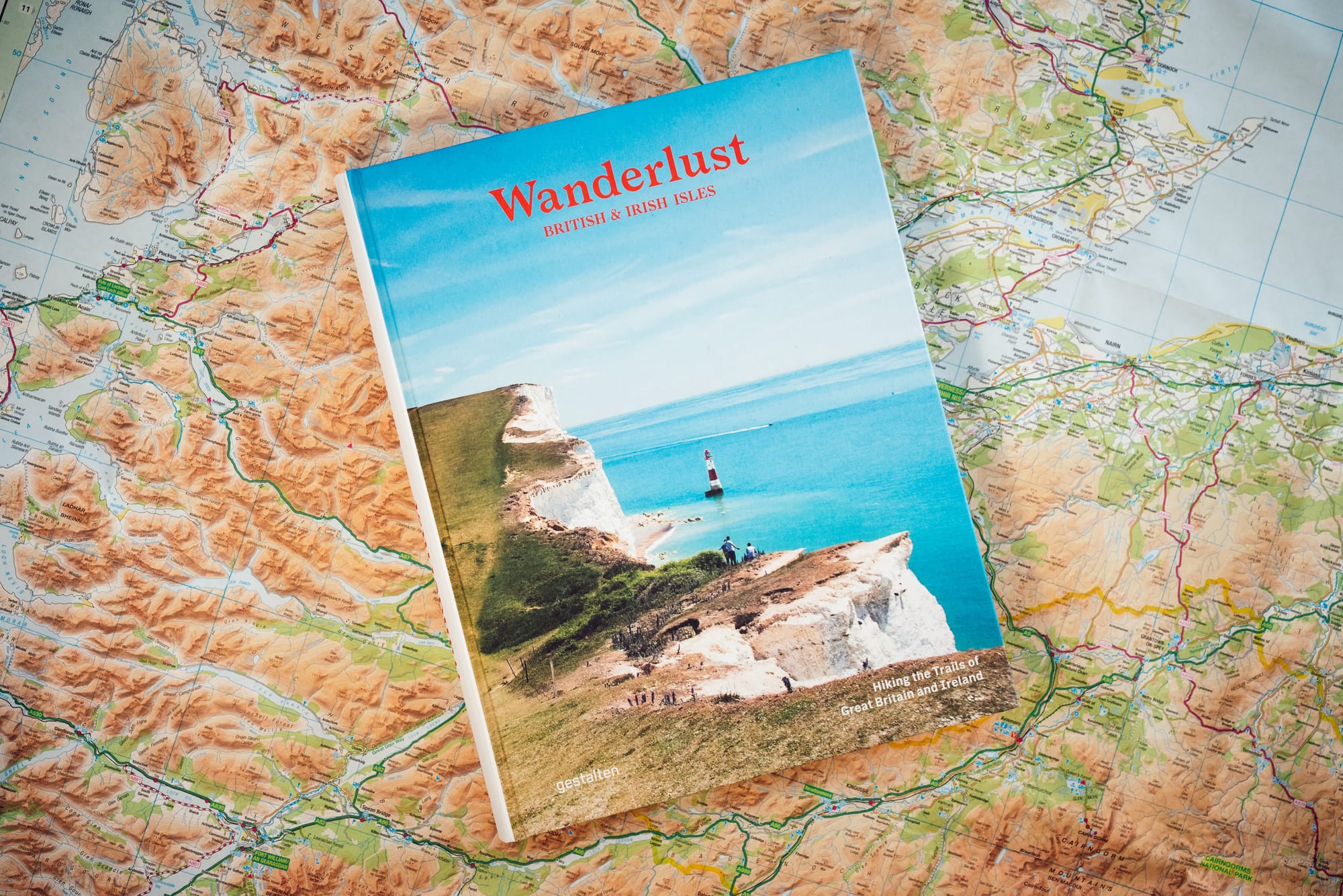
At the same time, traditional guidebooks still exist, and Cicerone Press continue to champion them. But I think their readers demand more from these books now. Better mapping, more precise and more up-to-date information. I know several guidebook authors and the message is pretty consistent: they're having to provide more, and often for less money.
Of course, digital information sources are now even more mainstream than they were in 2019. Most adventure apps now heavily feature a social-style feed designed to let you scroll through routes others have created. Planning your own route has taken a back seat to social discovery of what others have already done. Everything's a remix in 2025, and that includes adventure. Apps such as komoot allow you to follow routes in forensic detail, removing much of the calculated uncertainty of a well-crafted guidebook. As adventure merges with the machine, absolutely nothing is left to chance or the imagination. Maximum control and the quantified self are in the ascendancy; the Romantic image of the adventurer humble and at the mercy of Nature is in the decline.
At least in the mainstream. But it's beyond the mainstream where the interesting stuff is happening.
This is very much anecdotal, but I think the adventure community is splitting between those who expect and require much more information before and during their adventure... and those who are looking for much less. I see adventure storytelling focusing on those who go out of their way to limit the amount of control they have while in the field, because for them that is the very essence of adventure. They go places with poor mapping and no app coverage. They don't use a guidebook. They plan minimally and just let things unfold as they will. They let the winds of chance carry them forth, choosing to see mishaps as opportunities for interest and learning, as points in a narrative. They resist the machine urge to quantify and control and optimise. The experiences – and stories – are often all the better for it.
What about me personally? I feel guilty saying this, as someone very much in the industry and who has written inspiration-style guidebooks, but my preferred style is to wing it. I plan my own routes using a map and as few other info sources as possible, and I rarely go to the bother of creating gear lists or resupply plans any more, as I used to years ago. I collect far less data about the trip itself and never wear a GPS watch.
Adventure, for me, is best served with a healthy dose of uncertainty. So much in everyday life is controlled and calibrated; surely adventure is the one place where we can, and must, escape from all that?

From the archives
Yes, that anniversary is here – five years since the Covid lockdowns began here in the UK. I went spelunking in my journal to see what I was writing at the time. Back in 2020 I was writing journal entries almost every day (sadly I'm currently in a less prolific spell), but it's curious to read now how matter-of-fact many of those entries were. I wanted to record what was happening – an attempt, perhaps, to grasp the slippery nature of reality and set something down in permanent form. Feelings and personal impressions could wait until after I'd recorded the facts. What a scary and unstable time. Reflected, perhaps, in the terrible state of my handwriting here...
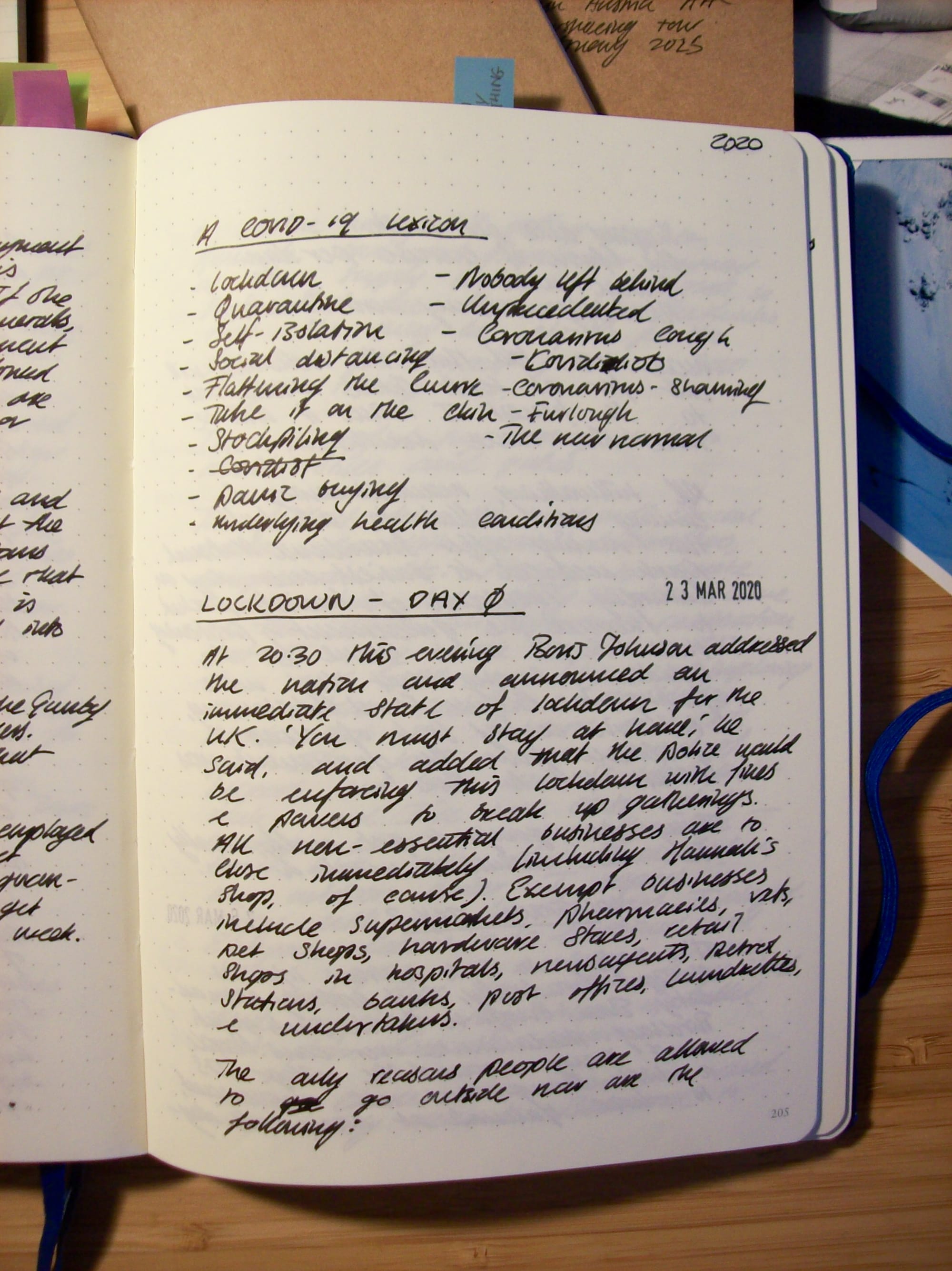
What I've been reading
Books and magazines
🔨 Blood in the Machine, Brian Merchant
I'm still reading this highly accessible intro to the Luddite uprising, which draws clear parallels between the 1810s and 2020s. From my notebook (emphasis mine):
We can look back at the Industrial Revolution and lament the working conditions, but popular culture still lionizes entrepreneurs cut in the mold of Arkwright, who made a choice to employ thousands of child laborers and to institute a dehumanizing system of factory work to increase revenue and lower costs. We have acclimated to the idea that such exploitation was somehow inevitable, even natural, while casting aspersions on movements like the Luddites as being technophobic for trying to stop it. We forget that working people vehemently opposed such exploitation from the beginning.
🏔️ The Great Outdoors, April 2025 issue
In the April 2025 issue of The Great Outdoors, I very much enjoyed the feature on hiking the Pamir Trail by Michaela Hrdá and Martina Merisi. What an incredible landscape.
After three weeks and 400km of the most diverse backpacking either of us had ever experienced, it felt as if we'd traversed the Alps, Dolomites, Pyrenees, Highland Scotland and the Moroccan Atlas in a single journey. Thankfully, the terrain then began to ease a little, rewarding us with moments of meditative harmony as we hit flow state and fell deeply in love with the simplicity and beauty of the Pamirs.
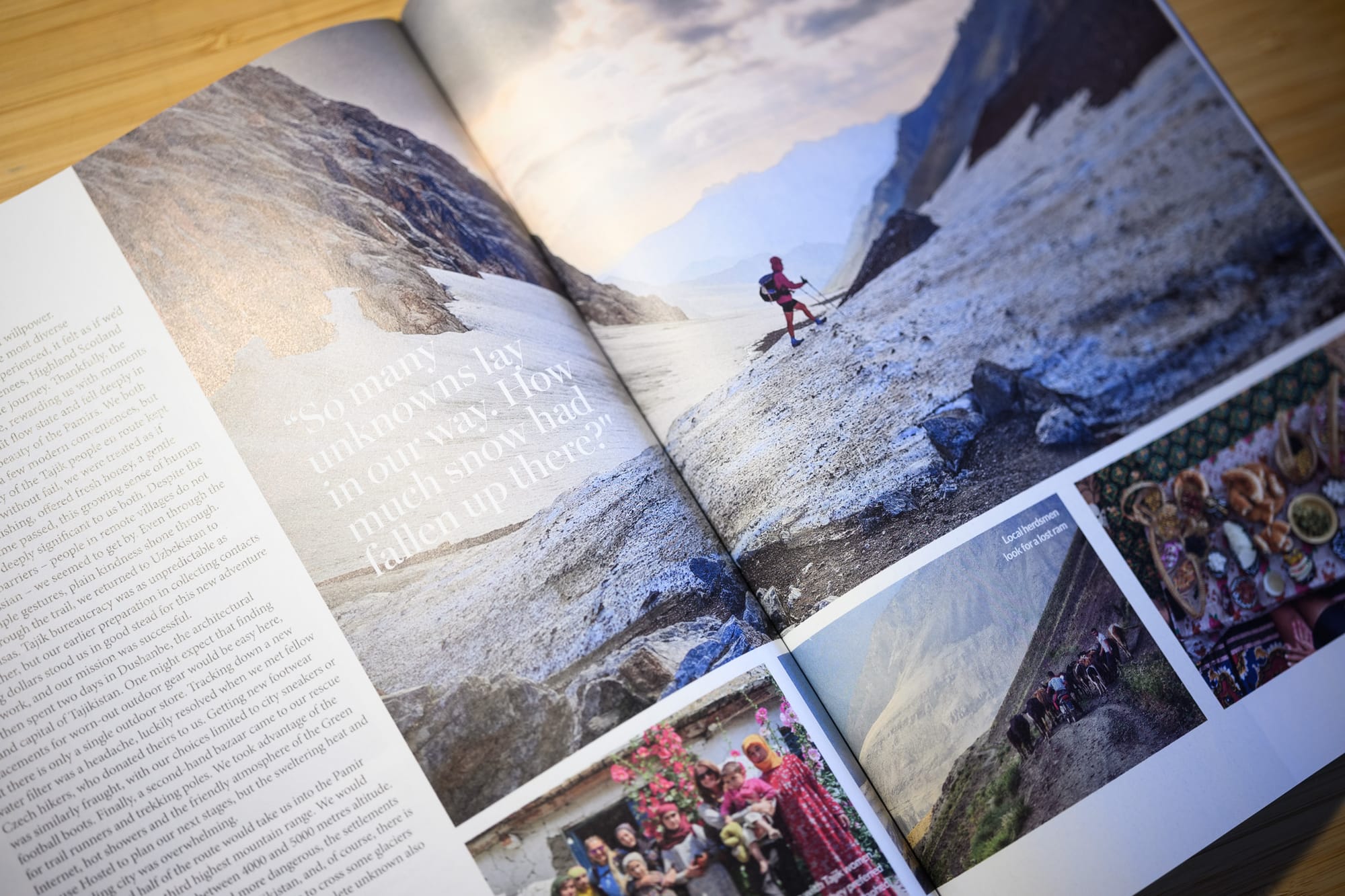
The first issue of New Mountain Magazine, a fresh publication devoted to 'real and relatable' adventure stories, is on my desk! And it is looking fabulous. I haven't dived in yet, but really looking forward to it.
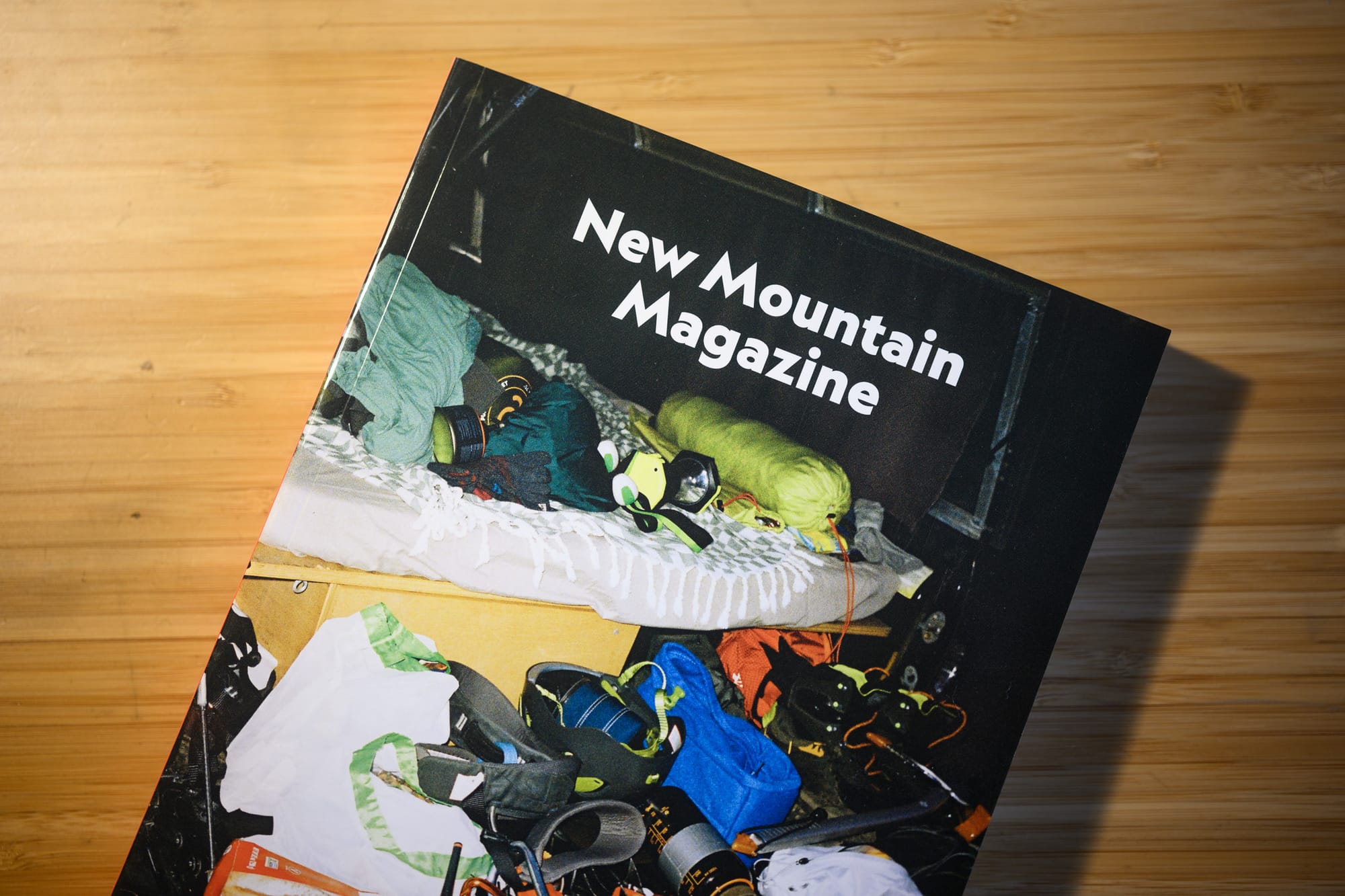
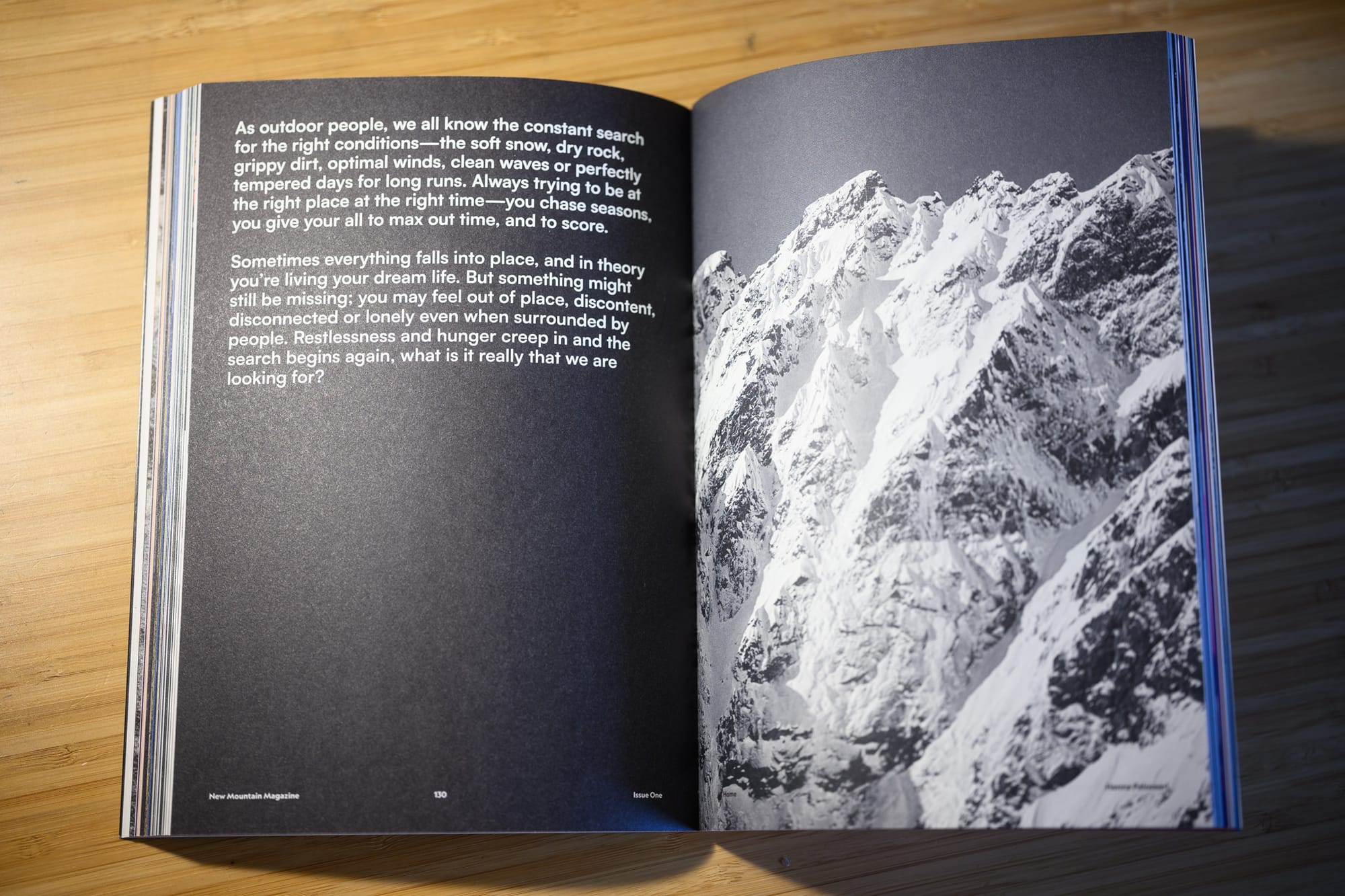
Online stuff
An urgent, devastating look at just what is happening to outdoors media. Ostensibly it's about the Outside debacle but it's really about much more than that. If you have skin in this game then please, please read this in full and digest its implications.
This is what happens when one tries to graft a tech company growth model onto media. The incentives don’t align. The values don’t align. Good content isn’t about scale; it’s about depth, and deeply understanding an audience.
Simon at Like the Wind writes a fun post here about our magazine media organisation from an imaginary viewpoint 10 years in the future. The Quartz Crisis, it turns out, can be used as a metaphor for understanding the current media crisis.
🏔️ Outsider
Lucy Wallace, a mountain leader, gear tester and writer I work with at TGO, has found her way to Substack!
I’ve made good decisions in the hills, based on hard won experience, and have even helped to inspire others. Each of these things, bit by tiny bit, have helped to shift me to a place of understanding. My gender, is obviously irrelevant, but so too is physical strength. There are many ways to be in the outdoors and none is more valid than the other.
🤖 Komoot Acquired: History Says This Won’t End Well
Related to 'There's a wildfire outside' linked above, the outdoor app komoot is about to dive headlong into the enshittification death spiral. I feel very sorry for the people who work there. For me this is just the latest in a long line of lessons why placing my faith in anything from the digital world is a bad plan. Perhaps we're all better off placing our faith in a bookshelf instead.
🌄 The Rise of the New Romanticism
An idea I've come across again and again recently is that the artistic and literary countercultural movement of Romanticism (late 18th to 19th centuries) is poised to make a comeback. Part of me could not be more thrilled by this; I dearly love Romantic art and music, and as countercultures go I identify with it strongly. By the time I was about 25 I knew all of Beethoven's symphonies by heart.
And yet the Romantic era was one of chaos and economic permacrisis and machine-breaking and a collapse of human meaning, as ours is. Again, think about the similarities between the 1810s and 2020s. New art and modes of thinking will emerge in counterpoint to the dystopian present (the ruins of our flirtation with a failed Enlightenment). It is arguable that these modes of thinking are emerging right now.
I could quote so much in this superb essay, but here are a couple of snippets that leapt out to me:
We can already read, write, and create. We can paint. We can publish books. We can make music. What is the purpose of having a machine do it for us? Why?
A serf cannot liberate himself until he knows he’s a serf. He must survey the land, his life, and his relation to power to see that he must get free. That is as hard as breaking the chains themselves. A decade ago, there was not much of this. There was a poppy effervescence about tech, an Obamaian optimism about how we could be made a tool of these conglomerates and it would all, somehow, sort itself out. Now we have woken to the world in front of us.
I'll have more, much more, to write about this topic in the future. I'm ready to wave this flag!
Ceinwen Langley has published a superb take on Severence, which has rapidly become one of my favourite sci-fi TV shows of all time. Did you SEE that last episode? An honest-to-God masterpiece, up there with The Matrix. We are all, I think, Severed...
I appreciated this deeply offbeat sci-fi short story, imagining a hypothetical future in which the machine has not only consumed creative human work but all human work.
This gentle interlude serves as a reminder that there is less separating human and Nature than we think. It reminded me of something I'm about to misquote, because I can't remember where I originally read it: 'I am not a human experiencing the universe; I am the universe having a human experience.'
In other news
In May 2024 I returned to Substack after about 18 months away. Since then I posted occasionally until the 1st of December, and then I began this new Unplugged newsletter. I'm pleased to say that I hit 900 Substack subscribers yesterday! This isn't from a standing start; I already had 750 subscribers in May last year. But 150 new people have chosen to receive this newsletter. Thank you and welcome. I have plans to devote more time to Unplugged, so I hope to do justice to your attention.
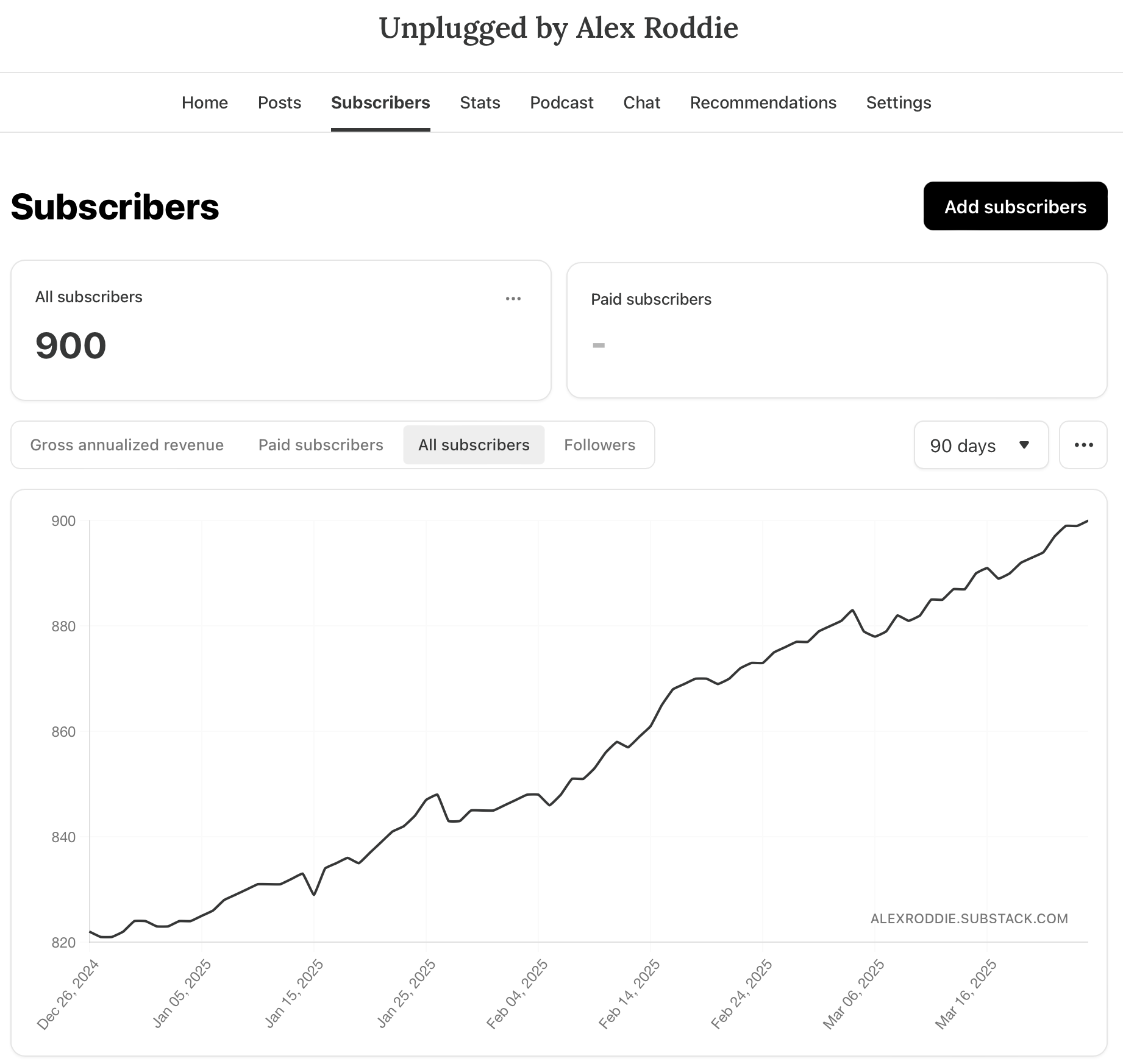
If you are reading on alexroddie.com, which is hosted using Ghost, here is the equivalent graph. A few new members have found their way to me, which is wonderful, but Substack is clearly where the growth is at the moment. I've found a vibrant community of readers who are passionate about real ideas and long-form writing, which is simply wonderful.
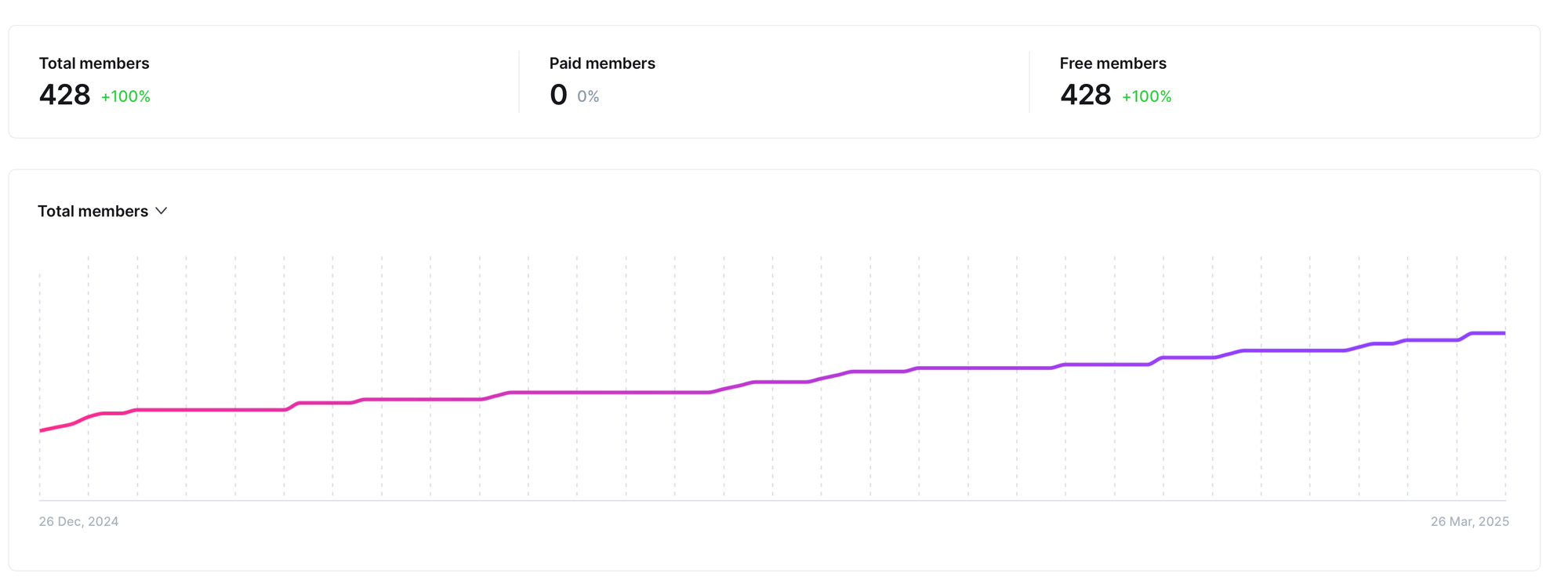
That's all, folks
If you like what you've read, please subscribe to receive updates in your inbox – or add my feed to your RSS reader. If you prefer to read on Substack, you can subscribe at alexroddie.substack.com. Thanks for your support. And if you've enjoyed what you have read, please tell someone else about it!
Are you receiving two copies of my posts in your inbox? You might be subscribed on both alexroddie.com and Substack. Here's a FAQ with instructions on what to do.
Alex Roddie Newsletter
Subscribe here to receive my occasional personal newsletter in your inbox. (For the fun stuff, please consider subscribing to Alpenglow Journal instead!)


